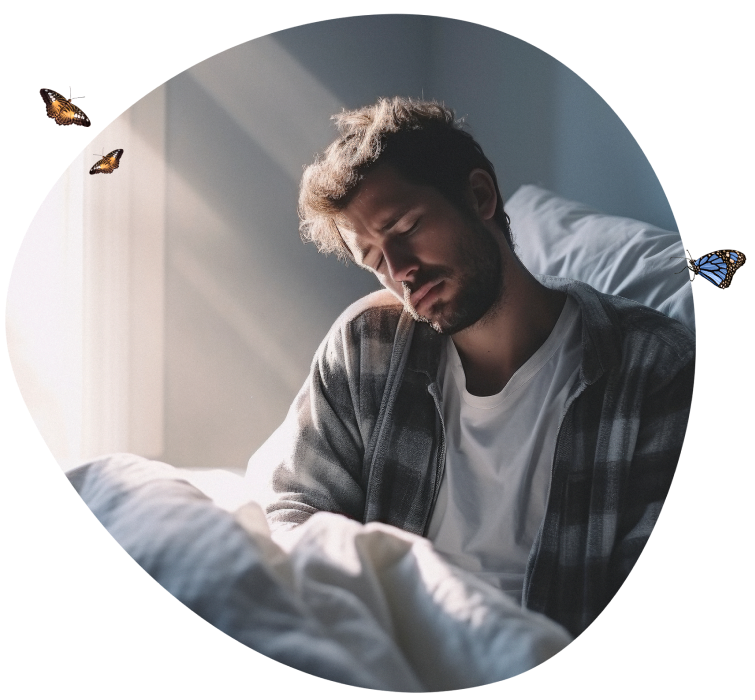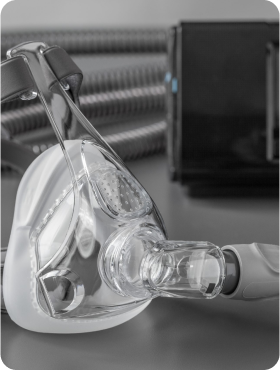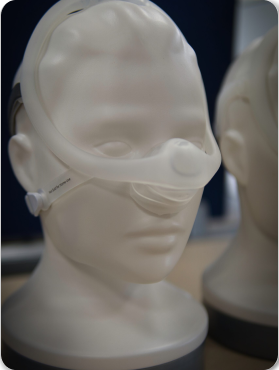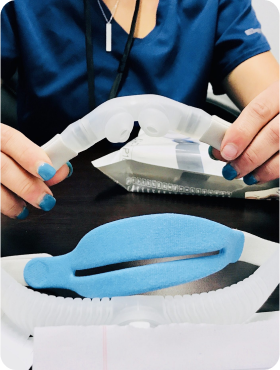Sleep Apnea
Sleep Apnea Is A Common Yet Serious Sleep Disorder That Affects Millions Of Americans Annually.
Everything You Need To Know About Sleep Apnea
This disorder has far-reaching consequences beyond just producing loud snoring; it’s been aptly
named the “silent killer.”
Shockingly, sleep apnea sufferers die on average a decade earlier than those without this condition.
Even worse, 85% of people with severe sleep apnea are unaware they have it!
Sleep apnea is a sleep disorder characterized by pauses in breathing or shallow breaths during sleep. These pauses can last several seconds to minutes, and they occur repeatedly throughout the night. The lack of oxygen can have a negative impact on one’s health and well-being, leading to fatigue, headaches, difficulty concentrating, and an increased risk of heart disease and stroke. People with sleep apnea may not even be aware that they are waking up in their sleep, resulting in being misdiagnosed for many years without treatment.
Central & Obstructive
Types Of Sleep Apnea
• Obstructive sleep apnea (OSA) is the more common type of disordered breathing that arises when throat muscles become too relaxed and impede airflow into the lungs. This is the most widespread manifestation of sleep apnea and is the easiest to treat.
• Central sleep apnea (CSA) is a disorder in which the brain fails to communicate with the muscles that control breathing, causing pauses in respiration.
Both types of sleep apnea can lead to serious health complications if left untreated, including an increased risk of heart attack, stroke, and high blood pressure.
If you suspect that you may be suffering from sleep apnea, it is essential to seek advice from your healthcare provider. A thorough diagnosis via a comprehensive sleep study can help identify the ideal course of treatment for your condition, so you can start taking steps towards healthier living and alleviating any related symptoms.


Do You Have Sleep Apnea?
Sleep Apnea Symptoms
It is oftentimes difficult to recognize which type of sleep apnea you have due to the similar symptoms between obstructive and central sleep apneas. General signs associated with both types include:
• Loud snoring.
• Gasping for air, choking sound during sleep.
• Daytime fatigue or sleepiness.
• Insomnia or other sleeping difficulties.
• Morning Headaches.
• Dry mouth and/or sore throat when awoken.
• Difficulty concentrating or staying focused on tasks.
• Irritability or mood swings throughout the day.
• Periodic episodes of apnea, or cessation of breathing while sleeping, which have been reported by another person.
Complications of Sleep Apnea
Sleep Apnea
Sleep apnea is a severe medical condition that could result in serious repercussions if left untreated. Potential dangers associated with Obstructive Sleep Apnea (OSA) are:
- Daytime fatigue
- Trouble concentrating
- Mood swings
- Falling asleep at work, watching TV, or driving.
- Irritability
- Depression
- Metabolic syndrome
- Liver Problems
- High Blood Pressure
- Heart Problems
- Type 2 Diabetes
- Sleep-deprived partners
- Daytime fatigue
- Trouble concentrating
- Mood swings
- Falling asleep at work, watching TV, or driving.
- Irritability
- Depression
- Metabolic syndrome
- Liver Problems
- High Blood Pressure
- Heart Problems
- Type 2 Diabetes
- Sleep-deprived partners
Find Your Perfect Fit
Masks Designed With You In Mind
CPAP masks come in three distinct styles, with all sizes catered for. If you are a woman and are looking for something that fits your unique facial features, some brands design “For Her” versions of these masks – specifically tailored to the shape of a female face.
Although a lightweight, small mask may seem ideal, there are other considerations that should be explored. For example, masks covering more of the face tend to offer superior protection against leaks and improved treatment overall. Even though these masks may weigh slightly more than others, you might find that full-face masks simply fit better – in the end it all comes down to personal preference as well as how certain styles will accommodate one’s unique facial shape.

Sub Heading

Sub Heading

Sub Heading
Vitalus Health
Sleep Apnea FAQ
What is sleep apnea?
Sleep apnea is a condition where breathing repeatedly stops or becomes shallow during sleep.
What causes sleep apnea?
It can be caused by obesity, blocked airways, genetics, smoking, alcohol use, or enlarged tonsils/tongue.
Are there any long-term effects of sleep apnea?
Yes, untreated sleep apnea can increase the risk of heart disease, stroke, high blood pressure, diabetes, and daytime fatigue.
What happens if I don't get treatment for sleep apnea?
It can cause serious health issues like heart disease, stroke, diabetes, high blood pressure, and daytime fatigue.
Is there a home test for sleep apnea?
Yes, at-home sleep apnea test kits are available, usually done under a doctor’s guidance.
Are there any treatments for sleep apnea?
Yes, treatments include CPAP therapy, oral appliances, lifestyle changes (like weight loss and avoiding alcohol), medication, or surgery.
What is CPAP therapy?
CPAP (Continuous Positive Airway Pressure) is a device that delivers steady air through a mask at night to keep the airway open.
Can sleep apnea be cured?
In some cases, weight loss or surgery can cure it, but for most people, it is managed rather than completely cured.
What other lifestyle changes can I make to help reduce my symptoms of sleep apnea?
Maintain a healthy weight, sleep on your side, avoid alcohol and smoking, exercise regularly, and follow a good sleep routine.
What is sleep apnea?
Sleep apnea is a condition where breathing repeatedly stops or becomes shallow during sleep.
What causes sleep apnea?
It can be caused by obesity, blocked airways, genetics, smoking, alcohol use, or enlarged tonsils/tongue.
Are there any long-term effects of sleep apnea?
Yes, untreated sleep apnea can increase the risk of heart disease, stroke, high blood pressure, diabetes, and daytime fatigue.
What happens if I don't get treatment for sleep apnea?
It can cause serious health issues like heart disease, stroke, diabetes, high blood pressure, and daytime fatigue.
Is there a home test for sleep apnea?
Yes, at-home sleep apnea test kits are available, usually done under a doctor’s guidance.
Are there any treatments for sleep apnea?
Yes, treatments include CPAP therapy, oral appliances, lifestyle changes (like weight loss and avoiding alcohol), medication, or surgery.
What is CPAP therapy?
CPAP (Continuous Positive Airway Pressure) is a device that delivers steady air through a mask at night to keep the airway open.
Can sleep apnea be cured?
In some cases, weight loss or surgery can cure it, but for most people, it is managed rather than completely cured.
Your Title Goes HereWhat other lifestyle changes can I make to help reduce my symptoms of sleep apnea?
Maintain a healthy weight, sleep on your side, avoid alcohol and smoking, exercise regularly, and follow a good sleep routine.

Reclaim Your Restful Nights!
Get The Help You Need
Sleep apnea is more than a sleeping disorder; it can impact your overall well-being. If you think you might be suffering from sleep apnea, Vitalus Health has got you covered.
Our team of experts are dedicated to providing personalized and comprehensive care. Whether you need a reliable at-home study to identify the appropriate solution for your condition or require help getting properly fit with a mask and equipment, we are here to provide support.
Furthermore, our expertise in this field has made us one of the most trusted providers when it comes to sleep apnea testing and equipment – allowing us to guarantee that you will get back on track with comfortable nights’ rest soon! Don’t wait any longer: contact our office today to start living comfortably again!
